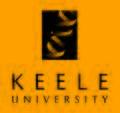| |
  
|
 |
|
Information for Postgraduates
As this page evolves, it will become a contents page for related articles
that should be of concern to postgraduate students. For now, however, it
is dedicated to research students, and relates primarily to writing M.Phil.
and Ph.D dissertations.
M.Phil. and Ph.D Dissertations: Some
Notes
I have just completed a 2-year M.Phil. course. I have also known various
M.Phil. and Ph.D students from the Department of Computer Science at Keele
Universiy. The following points arise from my own personal experiences and
from discussions with them. Hopefully, they will be useful to you as you
progress through writing your dissertation. They aren't in any particular
order, but hopefully will be more organised in the near future. They also
assume you're using Word, although I strongly recommend getting into LaTeX
(go here for the files and go here for a good LaTeX editor) as soon
as possible. It's complicated to use, though.
- Put each chapter in a separate Word file. It tends to grow to a
massive size (mine topped 35MB, and the only images used Word shapes).
However, make sure that each file has exactly the same page margins
etc. Otherwise, when you put it all together, Word will play havoc with
the layout.
- If you can, store the figures in a separate file, and add them
at the end. Otherwise, Word tends to mess up their placing as you add
and remove text, and sometimes refuses to let you move them to where
you want.
- Keep all your references in a database. Record every single
scrap of information that may be useful, lest you hunt for them again
at the end when you realise you've missed out something that you need
for the references section. This information includes:
- Article/chapter author(s) (Surname and all initials)
- Artice/chapter Editor(s)
- Article date (if applicable)
- Article/chapter title
- Journal/book title, author(s) and editor(s) in which it appears
- The volume and issue number (if a journal) or ISBN number, publisher
and publisher's city location (if a book)
- Anything else you deem might be important (this varies between
disciplines).
- Make sure you know the reference style to use. A common
convention to use these days is the Harvard style. Once you have over
100 references, it becomes tedious and time-consuming to convert them
all to the new style - especially given that the main body of your
work will probably reference some sources many times.
- Keep regular back-ups of your work. Periodically (when you've
added/changed significant amounts of text, or each day, for example)
copy the file and rename it according to the date on which you saved it
(e.g. thesis-22.10.03.doc).
- Unless you have a good idea beforehand exactly what your specific
research focus will be, work out what the most broad focal area
is as soon as possible (for example, for agent-based software
engineering, this would be software engineering). Secondly, if you can,
make a list of keywords that relate to things you're interested
in (for example, security, networks, AI, reliability). Thirdly, go
from one end of the library to the other, reading the contents of all
journals that may be appropriate and picking out those that relate to
the keywords you have written down. When you find something that
relates to this field, read the abstract to see if it might be useful.
If it introduces you to a
different aspect of your discipline, all the better - add it to your
list of keywords to look for. Photocopy or make notes on anything of
use. Don't worry or be put off if two articles say the same thing or
contradict each other - that's good, because you have two sources that
either back each other up or provide the basis for debate in your work.
Don't be surprised if this method returns about 50-100 useful papers.
You should spend a number of months at least at this stage, and it
takes time but is necessary.
- Don't neglect electronic journals and online journal databases.
Once you have a clearer picture of what you're looking at and what all
the terminology means, type some of the keywords you made (or even the
most focussed discipline you know you want to look at) into the search
engine and see what results it gives. Note those works that are most
(widely) cited: these are likely to be the core papers that provide the
foundation upon which the discipline, and thus your thesis, will
grow.
[Back to homepage]
|
|



